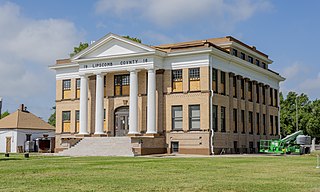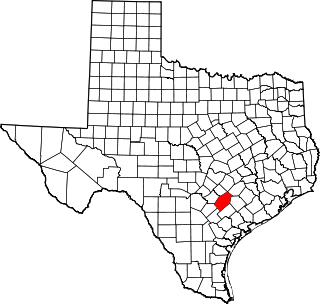Related Research Articles

Lipscomb County is a county located in the U.S. state of Texas. As of the 2020 census, its population was 3,059. Its county seat is Lipscomb. The county was created in 1876 and organized in 1887. It is named for Judge Abner Smith Lipscomb, a secretary of state of the Republic of Texas.

Hemphill County is a county located in the U.S. state of Texas. As of the 2020 census, its population was 3,382. The county seat and only incorporated community in the county is the city of Canadian. The county was created in 1876 and organized in 1887. It is named for John Hemphill, a judge and Confederate congressman. Hemphill County is the most recent Texas county to permit alcohol sales.

Gonzales County is a county in the U.S. state of Texas, adjacent to Greater Austin-San Antonio. As of the 2020 census, its population was 19,653. The county is named for its county seat, the city of Gonzales. The county was created in 1836 and organized the following year. As of August 2020, under strict budgetary limitations, the County of Gonzales government-body is unique in that it claims to have no commercial paper, regarding it as "the absence of any county debt."

George West is a city in Live Oak County, Texas, United States, and named for cattle rancher George Washington West. The population was 2,171 at the 2020 census. It is the county seat of Live Oak County. George West was named the "storytelling capital of Texas" in 2005 by the Texas Senate; and it hosts the George West Storyfest, a festival that features storytelling, cowboy poetry, and music. Numerous ranches surround George West.
Independence is an unincorporated community in Washington County, Texas, United States. According to the Handbook of Texas, the community had a population of 140 in 2000. It is located about an hour northwest of the Greater Houston metropolitan area.

Austin Presbyterian Theological Seminary is a Presbyterian seminary in Austin, Texas. It was founded in 1902 to provide pastors for the rapidly growing Presbyterian Church in the frontier Southwest. It opened its doors to five students on October 1, 1902, at Ninth and Navasota Streets. The seminary moved to its present location adjacent to the University of Texas at Austin campus in 1908.

Chriesman is an unincorporated community in Burleson County, Texas, United States. The population was 30 in 2000. It is located within the Bryan-College Station metropolitan area.

The Grove is an unincorporated community in Coryell County, Texas, United States. The area is known for its abundance of Texas bluebonnet flowers during the spring. According to the Handbook of Texas, the community had a population of 65 in 2000. It is located within the Killeen-Temple-Fort Hood metropolitan area.

The Gatesville State School for Boys was a juvenile corrections facility in Gatesville, Texas. The 900-acre (360 ha) facility was converted into two prisons for adults, the Christina Crain Unit, and the Hilltop Unit.

John Hemphill was an American politician and jurist who served as Chief Justice of the Supreme Court of the Republic of Texas from 1841 to 1846 and of the Supreme Court of Texas until 1858, and a United States senator from Texas from 1859 to 1861. A member of the Democratic Party, he was one of the signatories of the Confederate States Constitution.

Greenleaf Fisk (1807–1888) was a pioneer, known as "the Father of Brownwood, Texas". When a land and water dispute necessitated a new site for Brown County's seat of Brownwood, Fisk donated the land for the new location. He was a military veteran of the Texas Revolution and was a member of the Republic of Texas House of Representatives. Fisk was a Chief Justice when he lived in Bastrop, Texas. When he relocated his family to Brown County, he became a substantial land owner and served the people in several positions of local government. In 1968, the home of Greenleaf Fisk was designated a Recorded Texas Historic Landmark. February 25, 2004, the home was put on the National Register of Historic Places.

The First Presbyterian Church is a church in the Museum District of Houston, Texas. As of 2012 it had 3,567 members. The church has been located in the Museum District since 1948.

Mary Hunt Affleck was an American agrarian poet from Texas and a supporter of the Confederate States of America.
Gay Hill is an unincorporated area and a ghost town in Washington County, Texas, United States.
Hugh Wilson (1794–1868) was an American Presbyterian missionary and minister. He founded some of the first Presbyterian churches in Texas.
Mustang wine is a type of red wine made with mustang grapes, Vitis mustangensis, in Texas.
James Weston Miller (1815-1888) was an American Presbyterian minister, educator and Confederate chaplain in Texas during the American Civil War. He helped establish the First Presbyterian church in Houston and many Baptist and Methodist churches and schools for blacks. He also taught many daughters of the Southern aristocracy at the Live Oak Female Seminary in Gay Hill, Texas.
John Boyd was an American settler and politician. He served as a Congressman for the Republic of Texas and as a member of the Texas Senate.
Anne Valliant Burnett Tandy was an American heiress, rancher, horse breeder, philanthropist and art collector from Fort Worth, Texas.

Georgetown Female Seminary was an American school for young women located in Georgetown, Washington, D.C.
References
- 1 2 Carole E. Christian, "MILLER, JAMES WESTON," Handbook of Texas Online (http://www.tshaonline.org/handbook/online/articles/fmi18), accessed October 08, 2014. Uploaded on June 15, 2010. Published by the Texas State Historical Association.
- 1 2 3 4 5 6 7 8 9 10 11 12 13 Lel Purcell Hawkins, "LIVE OAK FEMALE SEMINARY," Handbook of Texas Online (http://www.tshaonline.org/handbook/online/articles/iwl03), accessed October 08, 2014. Uploaded on June 15, 2010. Published by the Texas State Historical Association.
- 1 2 3 4 5 6 Robert Finney Miller, 'Early Presbyterianism in Texas as Seen by Rev. James Weston Miller, D. D.', The Southwestern Historical Quarterly, Vol. 19, No. 2, 1915, pp. 159-183
- ↑ Lois Wood Burkhalter, Gideon Lincecum, 1793-1874: A Biography, Austin, Texas: University of Texas Press, 2010, p. 75
- ↑ Mary Henrietta Chase, Seeley family, M. H. Chase, 1961, Volume 1, p. 72